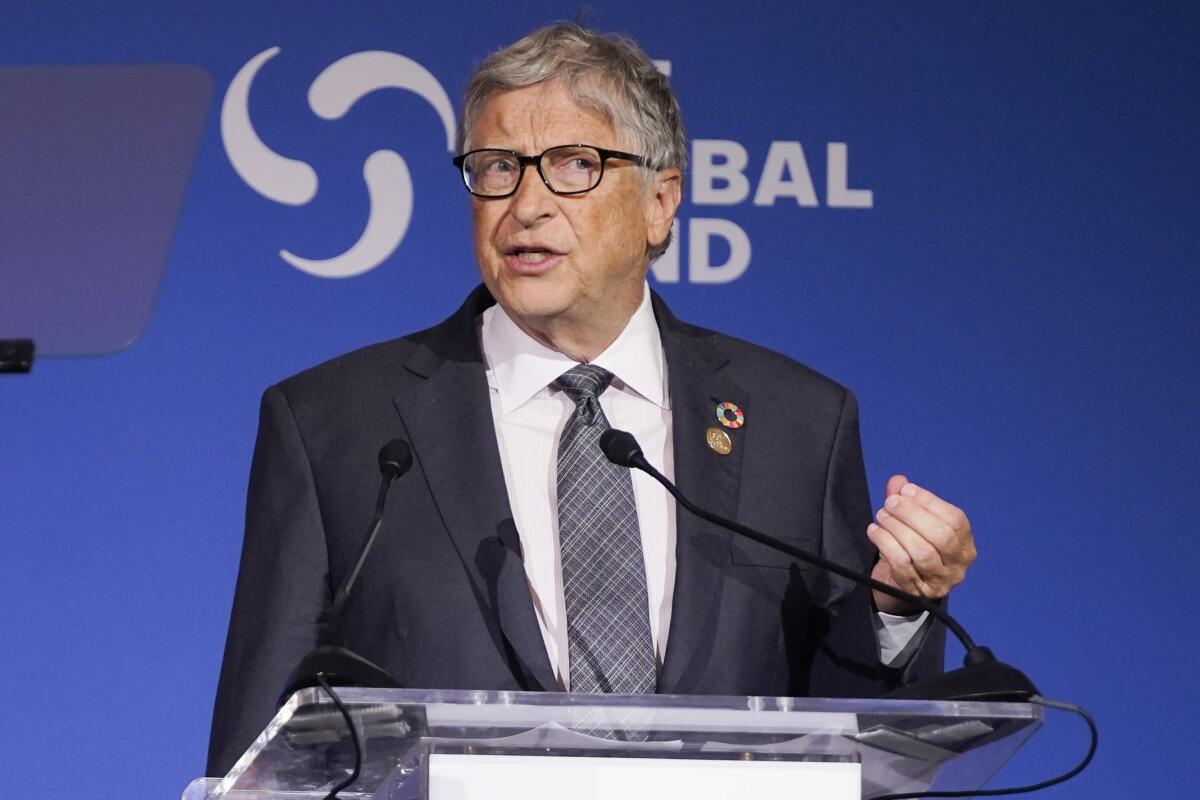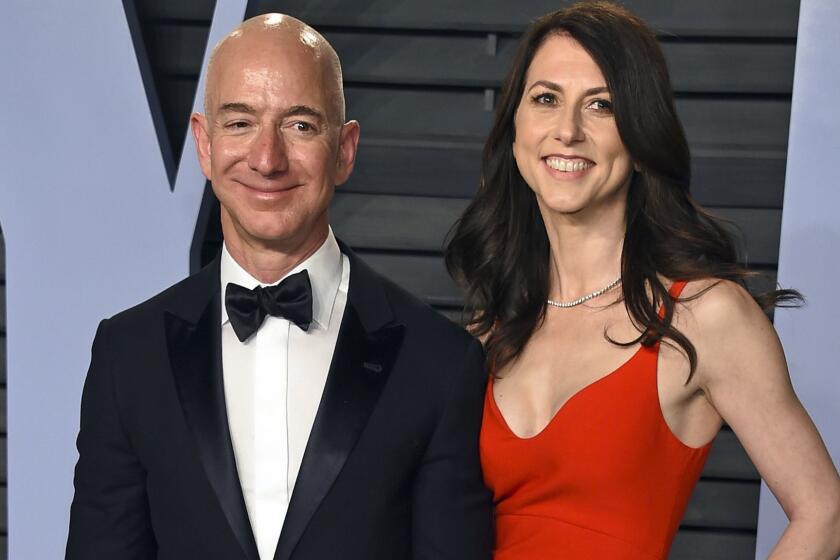Bill Gates made 2022’s biggest charitable donation: $5 billion

- Share via
A $5-billion donation by Microsoft co-founder Bill Gates to the eponymous foundation he started with his ex-wife was the largest charitable gift of 2022, according to an annual ranking compiled by the Chronicle of Philanthropy.
The publication’s annual list of the 10 largest charitable gifts announced by individuals or their foundations totaled nearly $9.3 billion in 2022. The contributions went to large, well-established institutions, three of them private foundations and three universities to support environmental sustainability, children’s mental health and stem-cell research. The other gifts backed cancer research and treatment, housing efforts, youth programs and reproductive health.
Two of the gifts exceeded $1 billion, and six of the eight donors (one donor made three gifts) are multibillionaires. The combined net worth of those six donors is slightly more than $325 billion.
Topping the list is Gates, who gave $5 billion to the Bill & Melinda Gates Foundation to back the grant maker’s work in global health, development, policy and advocacy and U.S. education. Gates, whose net worth is estimated at $104 billion, attracted attention in July when he announced he was giving $20 billion to the foundation he runs with his former wife, Melinda French Gates. However, foundation officials confirmed in December that three-fourths of that $20 billion went toward paying off the $15 billion he and French Gates had pledged in July 2021. The remaining $5 billion was a new infusion to the foundation.
Ann and John Doerr came in second with a $1.1-billion donation to Stanford University through their Benificus Foundation to launch the Stanford Doerr School of Sustainability, an effort to tackle the world’s most urgent climate and sustainability challenges. The new school will focus on these areas of scholarship: climate change; Earth and planetary sciences; energy technology; sustainable cities; the environment; food and water security; and human society, behavior and health.
The new school will house several academic departments and interdisciplinary institutes. It will also be home to a “sustainability accelerator,” which, among other efforts, will award grants to researchers and others to develop new technologies in environmental sustainability and related areas, advance new policies and support partnerships.
The world’s 18th-richest person from her holdings in Amazon, which her former husband Jeff Bezos founded, MacKenzie Scott says she is trying to give her fortune away even faster.
John Doerr is a venture-capital investor who made his mark and much of his fortune as an early backer of Silicon Valley technology giants such as Sun Microsystems, Amazon and Google. Today, he serves as chairman of the investment firm Kleiner Perkins, and his net worth stands at a little more than $9 billion.
Coming in third are Jackie and Mike Bezos, the mother and stepfather of Amazon founder Jeff Bezos. The couple gave the Fred Hutchinson Cancer Center $710.5 million through their Bezos Family Foundation to build 36 research labs and an additional large research facility. The grant will also support the cancer center’s clinical trials and immunotherapy research over the next 10 years.
The couple have been fairly low-profile philanthropists until recently. Yet Jackie Bezos has been closely involved in several nonprofit projects over the years. She created the Bezos Scholars Program at the Aspen Institute, the Aspen Challenge and Students Rebuild, all of which are education programs for various age groups. Mike Bezos spent 32 years working as an engineer and manager with the oil and gas giant Exxon Mobil before retiring and turning his attention to the couple’s giving.
The gifts from the Doerrs and the Bezoses were followed by one from Warren Buffett. The 92-year-old investor gave stock valued at nearly $474.3 million to the Susan Thompson Buffett Foundation, which Warren Buffett established in 1964 to manage his family’s charitable giving that was later renamed for his first wife, who died in 2004. The foundation supports women’s reproductive health and provides college scholarships for students in Nebraska, where the foundation is located.
A representative for Buffett confirmed the gift was a special one-time contribution that Buffett decided to make in late November rather than one of the annual donations he makes to the Susan Thompson Buffett Foundation, and several other grant makers, which are payments toward multibillion-dollar pledges he announced in 2006.
The late Ruth DeYoung Kohler II comes in fifth on the list. The Kohler Co. heiress, who died in 2020 at 79, left a $440-million bequest to launch the Ruth Foundation for the Arts, a Milwaukee grant maker that is devoted to supporting visual and performing arts groups throughout the country. It plans to award about $20 million a year. Kohler was an avid arts supporter and ran the John Michael Kohler Arts Center in Sheboygan, Wis., from 1972 to 2016.
Kohler II is followed by MacKenzie Scott, the novelist and Amazon co-founder, who gave $436 million to Habitat for Humanity International. The gift was unrestricted, as has been the case with most of Scott’s giving. When Habitat for Humanity officials announced the gift in March, they said they planned to use the money to tackle the global housing crisis and advocate for systemwide changes to increase fair access to low-cost housing.
Two additional gifts from Scott — $281 million to Boys & Girls Clubs of America and $275 million to the Planned Parenthood Federation of America — also landed on the list.
The Chronicle’s annual rankings are based on the 10 biggest publicly announced gifts.
The tally does not include contributions of artwork or gifts from anonymous donors.
This article was provided to the Associated Press by the Chronicle of Philanthropy. Maria Di Mento is a senior reporter at the Chronicle.
More to Read
Inside the business of entertainment
The Wide Shot brings you news, analysis and insights on everything from streaming wars to production — and what it all means for the future.
You may occasionally receive promotional content from the Los Angeles Times.











